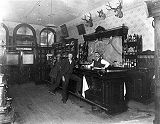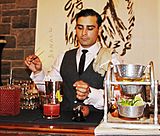Bartender
hideThis article has multiple issues. Please help or discuss these issues on the talk page. (Learn how and when to remove these template messages)
|


A bartender (also known as a barkeep, barman, barmaid, or a mixologist) is a person who formulates and serves alcoholic or soft drink beverages behind the bar, usually in a licensed establishment. Bartenders also usually maintain the supplies and inventory for the bar. A bartender can generally mix classic cocktails such as a Cosmopolitan, Manhattan, Old Fashioned, and Mojito.
Bartenders are also usually responsible for confirming that customers meet the legal drinking age requirements before serving them alcoholic beverages. In certain countries, such as Canada, the United Kingdom, and Sweden, bartenders are legally required to refuse more alcohol to drunk customers.[1]
History[]

Historically, bartending was a profession with a low reputation. It was perceived through the lens of ethical issues and various legal constraints related to the serving of alcohol.[2]
The pioneers of bartending as a serious profession appeared in the 19th century. "Professor" Jerry Thomas established the image of the bartender as a creative professional. Harry Johnson wrote a bartending manual and established the first bar management consulting agency.
At the turn of the 20th century, slightly less than half the bartenders in London were women, such as Ada Coleman. "Barmaids", as they were called, were usually the daughters of tradesmen or mechanics or, occasionally, young women from the "better-born" classes who had been "thrown upon their own resources" and needed an income.[3]
The bartending profession was generally a second occupation, used as transitional work for students to gain customer experience or to save money for university fees.[4] The reason for this is because bartenders in tipping countries such as Canada and the United States, can make significant money from their tips.[5] This view of bartending as a career is changing around the world, however, and bartending has become a profession by choice rather than necessity. It includes specialized education — operates in 25 countries.[2]
Cocktail competitions such as World Class and have recognised talented bartenders in the past decade and these bartenders, and others, spread the love of cocktails and hospitality throughout the world.[6] owner of expressed the difficulties with becoming a prolific bartender, comparing you to the drink you make: “In drinks you want balance. And you have to be balanced physically, emotionally and mentally.”[7]
By country[]
United Kingdom[]
In the United Kingdom, bar work is often not regarded as a long-term profession (unless the bartender is also the landlord), but more often as a second occupation, or transitional work for students to gain customer experience or to save money for university fees. As such, it lacks traditional employment protections and therefore has a high turnover. The high turnover of staff due to low wages and poor employee benefits results in a shortage of skilled bartenders. Whereas a career bartender would know drink recipes, serving techniques, alcohol contents, correct gas mixes and licensing law and would often have cordial relations with regular customers, short-term staff may lack these skills. Some pubs prefer experienced staff, although pub chains tend to accept inexperienced staff and provide training.
Tipping bartenders in the United Kingdom is uncommon, not considered mandatory but is greatly appreciated by the bartender. The appropriate way to tip a bartender in the UK is to say 'have one for yourself', encouraging the bartender to buy themselves a drink with one's money, where a bartender may instead opt to add a modest amount to a bill to take in cash at the end of their shift.
United States[]
The Bureau of Labor Statistics data on occupations in the United States, including that of bartender, publishes a detailed description of the bartender's typical duties[8] and employment and earning statistics by those so employed, with 55% of a bartender's take-home pay coming in the form of tips.[9][10] The hourly wage a bartender receives can vary depending on the state. The federal Fair Labor Standards Act (FLSA), and the laws of most states, allow employers a tip credit, which counts employees tips toward minimum wage. As of September 26, 2020, the federal minimum wage rate is $7.25/hour.[11]
Bartenders in the United States may work in a large variety of bars. These include hotel bars, restaurant bars, sports bars, gay bars, piano bars, and dive bars.[12][13] Also growing in popularity is the portable bar, which can be moved to different venues and special events.
Bartenders may attend special schools or learn while on the job.[14] Bartenders in the United States usually have on-the-job training, from the owners, management, or other superior staff with experience. Prospective bartenders may gain experience by working as wait staff in a restaurant with a bar. Some vocational schools offer bartenders licenses. Some US states require a bartenders license or a health certificate issued from the state.[citation needed]
Most pubs and bars seek to recruit outgoing, personable individuals as bartenders. All bartenders must comply with all food and beverage regulations, in the United States. All bartenders in the United States should be knowledgeable in mixing, garnishing, and serving drinks with a positive attitude and excellent communication skills. The competition for jobs is high in this field of work.[citation needed]
Gallery[]

Bartender and two patrons at the Toll Gate Saloon, Black Hawk, Colorado, c. 1897

Hotel bartenders in Toronto, 1911

British student working as a barmaid, 1990s

A bartender pouring some vodka into the metal cup of a cocktail shaker, 2000s

A bartender making a classic cocktail, 2010s
See also[]
- Bar-back, or runner, a bartender's assistant
- Flair bartending, mixing drinks as performance
- Hospitality
- List of bartenders
- List of public house topics
- List of restaurant terminology
- Tavern
- Vintner
References[]
- ^ "OLGR > Information and training for students and staff >". Olgr.nsw.gov.au. Archived from the original on October 22, 2013. Retrieved December 12, 2015.
- ^ Jump up to: a b De Mazenod, Anne-Sophie (July 19, 2017). "Barman, un phénomène de mode ?". Le Figaro. Retrieved July 12, 2018.
- ^ Joint Committee on the Employment of Barmaids (1905). Women as Barmaids: Published for the Joint Committee on the Employment of Barmaids. King. Retrieved September 1, 2016.
- ^ Lucas, Rosemary (2004). Employment relations in the hospitality and tourism industries. Routledge. pp. 27–42. ISBN 978-0-415-29712-7. Retrieved April 26, 2010.
- ^ "Bartending Salaries from Around the World". Bars and Bartending. June 2, 2013. Retrieved July 11, 2018.
- ^ "Bacardi Legacy Global Cocktail Competition announces The Top 25 | australianbartender.com.auaustralianbartender.com.au". Australianbartender.com.au. October 16, 2013. Retrieved December 12, 2015.
- ^ "The Rise of Career Bartending: The Good, the Bad and the Ugly". November 17, 2016.
- ^ U.S. Department of Labor, Bureau of Labor Statistics (January 2010). "Food and Beverage Serving and Related Workers". Occupational Outlook Handbook. Bulletin 2800 (2010–11 Library ed.). Washington, DC: U.S. Government Printing Office. p. 492. ISBN 978-0-16-084318-1. Archived from the original on April 16, 2010. Retrieved April 25, 2010.
- ^ U.S. Department of Labor, Bureau of Labor Statistics (May 4, 2009). "35-3011 Bartenders". Occupational Employment and Wages, May 2008. Archived from the original on May 28, 2010. Retrieved April 26, 2010.
- ^ "How to Become a Bartender". Break Into Bartending. Retrieved December 12, 2015.
- ^ "Minimum Wages for Tipped Employees". U.S. Department of Labor. January 1, 2019. Retrieved November 3, 2019.
- ^ "Cocktail lounge - definition of cocktail lounge by The Free Dictionary". Thefreedictionary.com. June 12, 2012. Retrieved December 12, 2015.
- ^ "Dictionary, Encyclopedia and Thesaurus". Thefreedictionary.com. Retrieved December 12, 2015.
- ^ "Bartending License Help". Bartendinglicensehelp.com. Retrieved July 1, 2019.
External links[]
| Look up bartender, barkeep, barmaid, or mixologist in Wiktionary, the free dictionary. |
| The Wikibook Bartending has a page on the topic of: Cocktails |
 Media related to Bartenders at Wikimedia Commons
Media related to Bartenders at Wikimedia Commons
- Bartending
- Food services occupations
- Restaurant terminology







